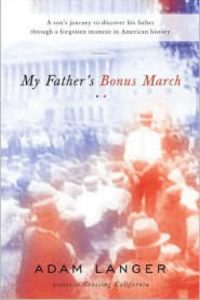The Story Behind the Book
When my father passed away in 2005 at the age of 80, he didn’t leave a great many unfinished projects. He’d led a successful, seemingly complete life: Born on Chicago’s Jewish West Side to immigrant, Yiddish-speaking parents, he grew up to be a physician, a husband, and a father. But there was a book he always talked about writing but never did, and after he died, I began to wonder about that book—why he didn’t write it; what it might have meant to him; what it might have symbolized about our relationship, one that was cordial enough but never particularly close.
My dad’s book was to be a comprehensive history of the Bonus March of 1932, which he called the most overlooked incident in 20th Century American history, and I only knew the little my father told me about it. During the incident in the depths of the Great Depression, 20,000 veterans descended upon the Washington, DC, residing in tents and huts while futilely awaiting passage of a bill that would pay them compensation they felt the government owed them. There was a violent skirmish that resulted in the deaths of two veterans and one police officer. Led by Army Chief of Staff Douglas MacArthur who claimed that the March was a Communist plot, the U.S. military went into action. Tent cities were set ablaze; tear gas was thrown; weary, malnourished veterans were pursued with bayonets and sabers by members of the very military they had served during the war.
Save for the occasional letter dictated to my mother and addressed to the editor of the Journal of the American Medical Association, my father was not a writer. He was a radiologist and, in what little spare time he allowed himself, a sketch artist and avid reader of military history. Nor was my father, despite his penchant for crew-cuts, police cruisers and handguns, a military man; though his father supposedly served as a muleskinner in World War I and his younger brother was stationed in Japan in WWII, my dad did not serve in World War II. Still, he always vowed to write his Bonus March history. He planned trips to the Hoover Library, penned Author’s Queries to the New York Times Book Review, took notes and wrote outlines for the book he once said he would write after he had retired from medicine.
Since my father died, I have been criss-crossing the country in search of my father’s story and that of the Bonus Marchers. My journeys have taken me to Washington, DC, Boston, Los Angeles, Iowa, Indianapolis, New York, and Chicago where both my father and myself were born. I have visited the sites of my father’s youth, talked to his contemporaries and classmates, spoken with historians and documentary filmmakers and members of my family in a search for the connections between my dad and the history he wanted to write. Along my way, I have met with or been aided by such disparate individuals as Senator John Kerry, filmmaker Ross McElwee, author and scholar Henry Louis Gates, Jr., editor Norman Podhoretz, NBC critic Gene Shalit, and countless others. The result is My Father’s Bonus March, a memoir about my generation and those of my father and his father.
I have set my first three novels (Crossing California, The Washington Story, and Ellington Boulevard) during the Iranian hostage crisis, the mayoralty of Harold Washington, and the real estate boom of the early 21st Century to bring into focus both individual lives and the historical events that played out behind them. In this book, I am doing something similarly micro- and macrocosmic, intertwining American and personal history. My Father’s Bonus March will illuminate the sometimes equally mysterious histories of my father and my country, to allow readers to glimpse an individual life and gain a greater knowledge of the times in which that individual lived. Both are stories of memory and forgetting, about America’s need to forget an event and my father’s need to remember it even as he was losing his own memory.
The last time I saw my dad, I introduced him to my then four-month-old daughter Nora. He didn’t say much during that visit, but when he saw me taking pictures of Nora, he wheeled toward her. “Make sure I’m in some of the pictures,” he said. Few days go by when I don’t think about those words. Just as he wanted to immortalize the veterans of the Bonus March, at the end, he too felt a profound need to be remembered. I have written this book both as tribute to both my father’s generation and also that of his father, to whom my dad wanted to honor by writing his book. memorialize by writing this book about him and the book he never wrote.

